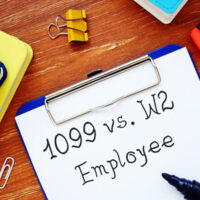What Are My Remedies If My Employer Misclassifies Me?

When an employee is hired, they are classified either as a full time employee or an independent contractor. This classification is anything but arbitrary; it is used primarily for tax purposes, but it also governs people’s entitlement to certain advantages and benefits of employment. Sometimes, an unscrupulous employer may misclassify full-time or part-time employees as independent contractors so as to avoid financial burdens. If this happens to you, you are being denied benefits that you deserve, and you have options in trying to get them.
Why Misclassify?
There are many different reasons that an employer may seek to misclassify employees, most of them monetary in origin. Using true independent contractors can save an employer money in countless legitimate ways – for example, independent contractors are usually not reimbursed for any accrued expenses. However, employers can save money by unethically classifying employees as independent contractors in several areas: for example, unemployment insurance, worker’s compensation insurance premiums, Social Security, temporary disability accommodations, and other areas.
Employers also often bank on the fact that many employees are not able to tell the difference between being an employee and being an independent contractor. To the person on the ground, it may not be particularly relevant. There is no hard and fast test as to who should be an employee or an independent contractor, at least not for tax purposes, but in general, control is the dispositive factor. If a worker has control over how they perform their work and what they use to perform it, they are more likely to be an independent contractor, but every case is different.
What Are My Options?
It is unfortunately common for the average worker to be unaware of their misclassification until it becomes an issue – for example, if they apply for workers’ compensation coverage and are declined because they are not classified as an employee. It is important to understand that if the misclassification is intentional, this does constitute fraud, and should be reported to the Joint Enforcement Task Force of the New York Department of Labor, which was created to help combat this kind of unethical behavior.
It may be necessary to file suit against your employer for unpaid wages or lost benefits, but if it comes to that, be advised that unintentional misclassification is viewed differently than intentional misclassification. While both carry penalties, intentional misclassification on your employer’s part is taken much more seriously. Employees who have been misclassified may be entitled to recover double damages, and in truly extreme cases, the person or people who made the choice to misclassify employees may even face prison time.
Contact A New York Employment Law Attorney
An employee is entitled to the benefits they were promised, and if they do not get that, they have the right to complain. Contacting a New York City employment misclassification lawyer from Mansell Law is a good first step toward forming a plan to get what you deserve. We are happy to try and assist you – contact our offices at (646) 921-8900 for a free consultation.
Source:
irs.gov/businesses/small-businesses-self-employed/independent-contractor-self-employed-or-employee
